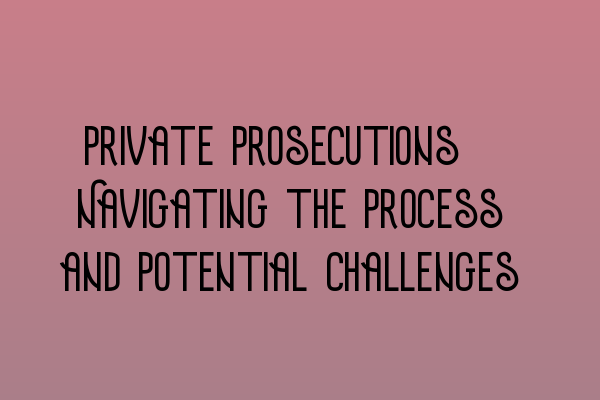Private Prosecutions: Navigating the Process and Potential Challenges
A private prosecution can be a powerful tool for individuals and businesses seeking justice in criminal matters. It allows the victim to initiate criminal proceedings against an alleged offender, independently of the state prosecuting authorities. In this blog post, we will guide you through the process of private prosecutions, highlighting potential challenges along the way.
Understanding the Process
Before delving into the potential challenges, let’s first establish a clear understanding of the private prosecution process. It typically involves the following key stages:
- Initial Assessment: This stage involves determining whether a private prosecution is a viable option, considering factors such as the seriousness of the offense and the availability of evidence. Consulting with experienced criminal solicitors during this stage is crucial to ensure the best chances of success.
- Gathering Evidence: Building a solid case relies on gathering compelling evidence. This could involve witness statements, CCTV footage, forensic reports, or any other relevant documentation. The evidence must be admissible in court and satisfy the burden of proof required in criminal cases.
- Preparing the Case: Once the evidence is collected, the prosecution team needs to prepare the case for court. This includes drafting a detailed statement of facts, identifying legal arguments, and preparing any necessary expert reports.
- Issuing Proceedings: The private prosecutor needs to make formal arrangements to issue court proceedings against the accused. This involves filing the necessary documentation with the court and paying the required fees.
- Court Proceedings: Similar to state prosecutions, private prosecutions involve court hearings, witness testimonies, cross-examinations, and legal arguments. The private prosecutor must present their case and convince the court of the accused’s guilt beyond a reasonable doubt.
- Verdict and Sentencing: If the court finds the accused guilty, they will proceed to pronounce a verdict and determine an appropriate sentence. This could involve fines, imprisonment, community service, or other penalties depending on the nature and severity of the offense.
Potential Challenges in Private Prosecutions
While private prosecutions offer an alternative route to justice, they do come with their fair share of challenges. Understanding these challenges is crucial to navigate the process effectively. Here are some common obstacles:
Cost
Private prosecutions can be expensive, as the financial burden falls on the private prosecutor. Costs include legal fees, court fees, expert witness fees, and other associated expenses. It is essential to have a clear understanding of the potential costs involved before pursuing a private prosecution. Seeking legal advice and exploring available funding options can help mitigate this challenge.
Evidentiary Requirements
Private prosecutors must meet stringent evidentiary requirements to secure a conviction. The evidence must be admissible in court and satisfy the high burden of proof beyond a reasonable doubt. Meeting these requirements can be particularly challenging, especially for complex cases. Seeking guidance from experienced criminal solicitors can ensure that the evidence collected is legally sound and persuasive.
Legal Expertise
Private prosecutions require a solid understanding of criminal law and procedure. Navigating the complex legal landscape can be daunting for individuals without legal training or experience. Engaging the services of knowledgeable criminal solicitors who specialize in private prosecutions can greatly enhance the chances of success in court.
Public Perception
Private prosecutions can sometimes be met with skepticism or criticism, as they deviate from the traditional role of state prosecuting authorities. It is essential to manage public perception and effectively communicate the reasons behind pursuing a private prosecution. A strong legal team can help present the case in a compelling manner, emphasizing the pursuit of justice and the right to a fair trial.
Conclusion
Private prosecutions offer an avenue for individuals and businesses to seek justice in criminal matters. While the process may present challenges, with careful consideration and expert legal advice, private prosecutions can be an effective tool to hold offenders accountable. If you are considering a private prosecution, consult with experienced criminal solicitors who can guide you through the process and help you navigate any potential challenges.
For further information on the SQE exams and preparation, check out our related articles:
